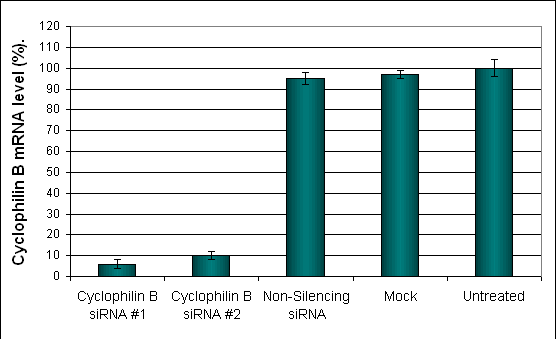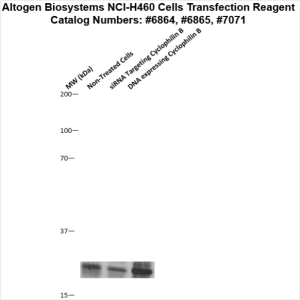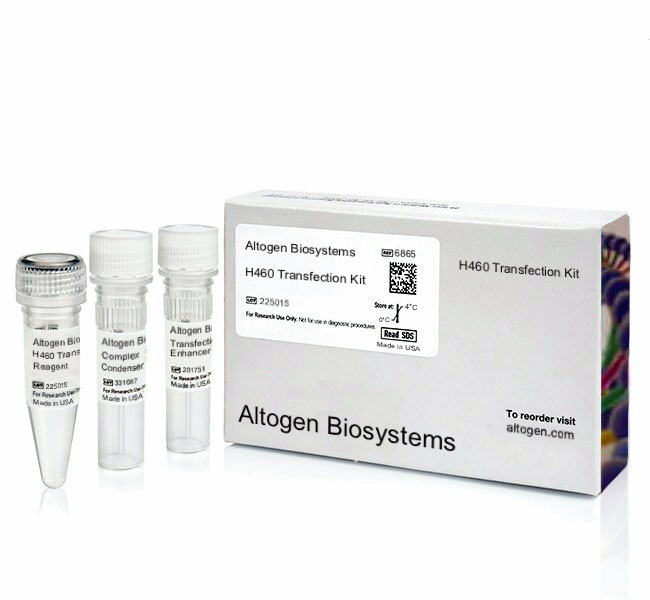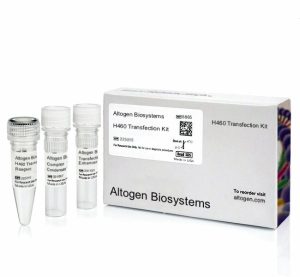Description
Purchase Orders: Click “Add to Cart” button to order, then email PO to orders@altogen.com.
Product Availability: In Stock.
Transfection Reagent for NCI-H460 Cells (Lung Carcinoma Cells, HTB-177)
- Proprietary cationic lipids formulation
-
High transfection efficiency of small RNA (siRNA, shRNA, miRNA), mRNA, and pDNA
-
Effective and robust intracellular delivery
-
Kit includes Complex Condenser and Transfection Enhancer reagents
-
Produces consistent results, lot-to-lot, plate-to-plate, and well-to-well
-
A proven reagent for establishing stable cell lines
-
Optimized transfection protocols are adapted for use with both standard & reverse transfection methods
-
Download in vitro NCIH460 transfection protocol: [PDF]
- Download NCI-H460 CRISPR/Cas9 transfection protocol: [PDF]
- Download PowerPoint presentation for NCI-H441 cells transfection kit: [PPT]
-
Developed and manufactured by Altogen Biosystems
Transfection Efficiency:
Reagent exhibits at least 90% transfection efficiency of siRNA delivery. Transfection efficiency was determined by RT-PCR.
Product Description:
Optimized transfection kit for high transfection efficiency of H460 cell line, a human lung carcinoma cells. Used in molecular biology to facilitate the introduction of foreign nucleic acids (DNA and RNA) into H460 cells. Compatible with DNA and RNA transfection.
Transfection Protocol and SDS:
Download Altogen Biosystems NCIH460 Transfection Protocol: [PDF]
Download SDS: [PDF]
NCI-H460 Cell Line:
NCI-H460 is a human non-small cell lung cancer cell line that was originally derived from a patient with large cell lung carcinoma. NCI-H460 cells are characterized by their high proliferation rate and resistance to apoptosis, which is the programmed cell death that helps to control cell growth and division. These cells also have a deletion in the TP53 gene, which encodes for the p53 tumor suppressor protein, and a mutation in the RB1 gene, which encodes for the pRB tumor suppressor protein. Researchers have used NCI-H460 cells to study various aspects of lung cancer biology, including the signaling pathways that drive tumor growth and metastasis, the mechanisms of drug resistance, and the development of new therapeutic agents. This cell line has also been used to study the role of p53 and pRB in cancer development and to test the efficacy of novel drugs targeting these pathways.
Lung cancer is considered one of the most lethal diseases with a low survival, high metastasis and recurrence rate. Although lung cancer treatment has dramatically improved within the last two decades, it is the primary cause of cancer deaths in both males and females globally. It results in approximately 158,000 fatalities in the United States annually, with more than half of the patients diagnosed at an advanced stage, as per the American Cancer Society. The NCI-H460 cell line was derived by A.F. Gazdar and colleagues in 1982 from a male with large cell lung carcinoma. This tumorigenic cell line exhibits epithelial morphology and has been known to express p53 mRNA as normal lung tissue does. The NCI-H460 cell line is also unique in the fact that it shows no significant structural DNA abnormalities. In addition to being negative for neurofilament triplet protein, NCI-H460 cells stain positively for vimentin and keratin. NCI-H46 is a hypotriploid cell line with the modal chromosome number of 57 that is essential for lung cancer research. Altogen Biosystems provides high efficiency lipid-based transfection reagent kits for the tumorigenic NCI-H460 lung cancer cell line.
Mutations:
| KRAS | 3845 | 37 | 12 | 25380275 | 25380275 | Missense_Mutation | SNP | T | A |
| ACSM2B | 348158 | 37 | 16 | 20554476 | 20554476 | Missense_Mutation | SNP | C | T |
| LNPEP | 4012 | 37 | 5 | 96333740 | 96333740 | Missense_Mutation | SNP | G | A |
| SHANK2 | 22941 | 37 | 11 | 70331426 | 70331426 | Missense_Mutation | SNP | C | G |
| B3GALT6 | 126792 | 37 | 1 | 1168520 | 1168520 | Nonsense_Mutation | SNP | G | T |
| ATAD3B | 83858 | 37 | 1 | 1431121 | 1431121 | Missense_Mutation | SNP | G | T |
| TMEM57 | 55219 | 37 | 1 | 25815743 | 25815743 | Missense_Mutation | SNP | G | T |
| AHDC1 | 27245 | 37 | 1 | 27876608 | 27876608 | Silent | SNP | G | A |
| RNF220 | 55182 | 37 | 1 | 44877841 | 44877841 | Silent | SNP | A | T |
| SYDE2 | 84144 | 37 | 1 | 85665962 | 85665962 | Missense_Mutation | SNP | G | A |
Data:

Figure 1. Cyclophilin B silencing efficiency was determined by RT-PCR in the NCI-460 cells transfected by Cyclophilin B siRNA or non-silencing siRNA control following the recommended transfection protocol. Cyclophilin mRNA expression levels were measured 48 hours post-transfection. 18S rRNA levels were used to normalize the Cyclophilin B data. Values are normalized to untreated sample. Data are presented as means ± SD (n=6).

Figure 2. Protein expression Cyclophilin B in NCI-H460 cells. DNA plasmid expressing Cyclophilin B or siRNA targeting Cyclophilin B were transfected into NCI-H460 cells following Altogen Biosystems transfection protocol. At 72 hours post-transfection the cells were analyzed by Western Blot for protein expression levels (normalized by total protein, 10 µg of total protein loaded per each well). Untreated cells used as a negative control.
Selected in vivo transfection product citations (ALTOGEN® IN VIVO Transfection Kits used in the following publications):
- Nature. 2008 454(7203):523-7. Innate immunity induced by composition-dependent RIG-I …Saito et al [PDF]
- Am J Pathology. 2010 177(4):1870-80. Role of ocular complement factor H in a murine model … Lyzogubov et al [PDF]
- Nature Biotechnology. 2011 29(4):341-5. Delivery of siRNA to the mouse brain by … Alvarez-Erviti et al [PDF]
- Cancer Research. 2011 71(15):5144-53. Inhibition of miR-193a expression by… Iliopoulos et al [PDF]
- RNA. 2010 16(11):2108-19. RNase L releases a small RNA from HCV RNA that refolds … Malathi et al [PDF]
- Diabetologia. 2012 55(7):2069-79. The p47phox- and NADPH oxidase organiser 1 … Youn et al [PDF]
- British Journal of Cancer. 2012 107(3):516-26. TIGAR induces p53-mediated cell-cycle … Madan et al [PDF]
- Hypertension. 2014 63(2):353-61. Tissue transglutaminase contributes to … Liu et al [PDF]
- Circulation Research. 2010 15;107(8). Kruppel-like factor-4 transcriptionally regulates … Cowan et al [PDF]
- Hypertension. 2012 59(1):158-66. Role of uncoupled endothelial nitric oxide synthase … Gao et al [PDF]
- Jounal of Biological Chemistry. 2012 287(4):2907. Chaperoning of mutant p53 protein … Gogna et al [PDF]
- PLoS Pathogens. 2012 8(8) Uridine composition of the poly-U/UC tract of HCV RNA … Schnell et al [PDF]
- J Proteome Res. 2012(11) Retinal proteome analysis in a mouse model of oxygen-induced … Kim et al [PDF]
- Gastroenterology. 2011 141(2) Differential type I interferon-mediated autophagic trafficking … Desai et al [PDF]
- PLoS Pathog. 2014 10(10) Exosomes from hepatitis C infected patients transmit HCV … Bukong et al [PDF]
Altogen Biosystems manufacturers over 100 pre-optimized in vitro transfection kits for cancer cell lines and primary cells, elecroporation products, and tissue-targeted in vivo delivery reagents for life science research. Advanced formulation of reagents and optimized transfection protocols provide efficient intracellular delivery of protein, DNA, mRNA, shRNA and siRNA molecules. Read more about transfection technology at Altogen’s Transfection Resource. Altogen Labs provides safety and efficacy preclinical research services. GLP-compliant studies for IND applications, and drug development, including over 90 in-house validated xenograft models, safety toxicology, etc (visit AltogenLabs.com).
Volume Options:
- 0.5 ml (Catalog #6864)
- 1.5 ml (Catalog #6865)
- 1.5 ml CRISPR (Catalog #2182)
- 8.0 ml (Catalog #7071)
Purchase Orders: Click “Add to Cart” button to order, then email PO to orders@altogen.com.
Product Availability: In Stock.






